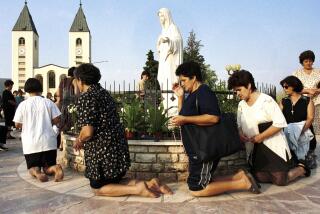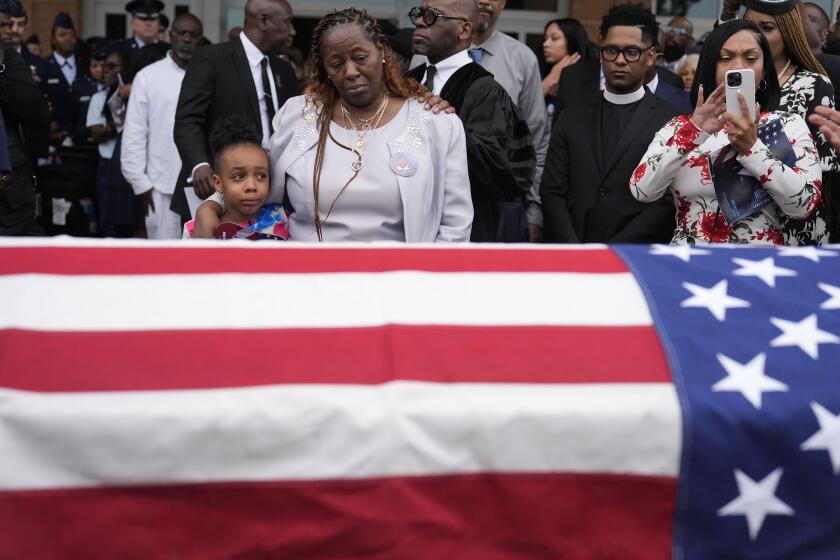Landmark Election Reform Package OKd in Nicaragua
Nicaragua’s Sandinista government and political opposition agreed Friday on a package of electoral reforms that both sides hailed as a landmark step toward free elections next year and an end to the U.S.-backed Contra rebellion.
President Daniel Ortega signed the accord with delegates of 22 anti-Sandinista groups after all-night negotiations in the Nicaraguan capital on the eve of a five-nation Central American peace summit here.
“We have taken a very important step toward strengthening a pluralistic society,” Ortega told bleary-eyed negotiators after nearly 23 hours of talks in Managua’s convention center. “I hope the North American government will respect this agreement between sovereign Nicaraguans and cease its policy of aggression.”
The three-day summit--among the presidents of Costa Rica, El Salvador, Guatemala, Honduras and Nicaragua--is supposed to set the conditions and timetable for disarming 11,000 Nicaraguan rebels who have been largely idle and camped in Honduras under an informal 16-month truce.
Ortega is pushing a plan that would close the rebel camps within 90 days under international supervision, while the Bush Administration has been lobbying the other four presidents to block the process or delay it until after the Feb. 25 elections in Nicaragua.
The Sandinista leader’s agreement with the political parties strengthens his hand at the summit because it contains a joint appeal for the adoption here of some plan for disbanding the rebels, formally ending more than seven years of war.
Although it stopped short of endorsing a 90-day timetable, the appeal was the first of its kind by a broad spectrum of political opposition groups, many of which have defended the Contra cause.
In return, Ortega accepted all but a handful of the more than two dozen demands put forward by opposition leaders as conditions for a fair campaign and free elections.
He took two steps toward neutralizing the 75,000-member Sandinista army, which is tightly controlled by the ruling party, as a potential tool of vote fraud: He suspended the military draft from Sept. 1 though election day and agreed to require soldiers to cast their ballots at civilian polling stations.
Other Concessions
The president also agreed to abolish Sandinista police powers to conduct arbitrary arrests and summary trials; to transfer the state’s power to supervise communications media to a multi-party electoral council during the six-month campaign, and to halt the Sandinista practice of confiscating private property “for purely political reasons.”
The accord was the first of any consequence between the Sandinistas and their internal political foes since a Central American peace treaty two years ago called for national dialogue and reconciliation in countries torn by civil strife.
Opposition leaders joined Ortega in describing the accord as historic.
Lauded by Opposition
“We believe this opens an opportunity to develop our democracy,” said Silviano Matamoros, a conservative with close ties to the exiled Contra leadership. “This is a victory for the Nicaraguan people.”
Luis Sanchez Sancho, a socialist, said the government had accepted “75% of our demands” and called the agreement “a key advance toward the establishment of a lasting peace.”
Matamoros and Sanchez were among five negotiators for the 14-party National Opposition Union, the principal anti-Sandinista coalition.
Sanchez said the bloc’s main setback was its failure to break the Sandinista monopoly on television and gain its own station. Instead, opposition candidates were given 30 minutes of air time six nights a week to share among themselves, starting Aug. 26.
“We are going to continue demanding better conditions, but the most important thing is that we are advancing,” he said.
Vote for Exiles Rejected
The opposition also failed to win the right for Nicaraguan exiles, who are overwhelmingly anti-Sandinista, to cast ballots outside the country. In addition, Ortega refused to abolish military conscription for good or at least release current conscripts during the campaign.
Nor did he indicate any willingness to negotiate further reforms sought by the opposition, such as a restructuring of the powerful five-man electoral council, which is criticized as biased toward the Sandinistas.
But he acceded to a number of technical reforms that will make it easier for the opposition to monitor the election. For example, opposition poll watchers will be allowed to inspect voting booths, receive copies of official returns at each station and join in escorting ballot boxes to regional counting centers.
‘Undercover Activities’
Both sides asked governments outside the region to refrain from “undercover activities” in favor of any party in the campaign, a reference to potential CIA funding for the opposition that the U.S. Congress has refused to ban.
Ortega reiterated his party’s pledge to refrain from using government buildings or vehicles in the campaign. And he agreed to adopt a civil service law protecting the jobs of state workers who refuse to campaign for the Sandinistas.
Ortega won two-thirds of the vote in the November, 1984, election, the only one held since the Sandinistas seized power in a guerrilla uprising 10 years ago. The strongest opposition parties pulled out of that race, charging unfair campaign conditions.
Seeking Reelection
The Sandinista leader, who is seeking reelection, agreed last February at the previous Central American summit to hold the 1990 elections more than nine months ahead of schedule in exchange for a preliminary commitment by Honduras to close the rebel camps. The talks in Managua were meant to comply with the previous summit agreement calling for fair election conditions.
One issue unresolved until now was whether Ortega would turn over the presidency ahead of time if he lost. Under the agreement in Managua, the new six-year terms for president, vice president and National Assembly members will begin two months after the vote.
Bureau assistant Isaac Narvaez contributed to this story in Managua.
More to Read
Start your day right
Sign up for Essential California for news, features and recommendations from the L.A. Times and beyond in your inbox six days a week.
You may occasionally receive promotional content from the Los Angeles Times.






